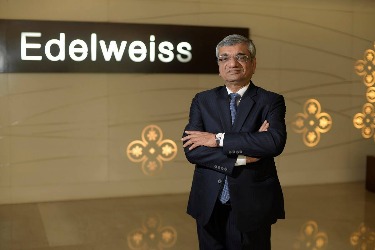ARCS
Edelweiss ARC's growth plans in COVID-ravaged year
After leading Edelweiss ARC to a record recovery in FY20, CEO RK Bansal has revised recovery & bad loan acquisition as intensity of Covid spreads in India.
After leading Edelweiss ARC to a record recovery in FY20, CEO RK Bansal has revised recovery & bad loan acquisition as intensity of Covid spreads in India.

After leading Edelweiss ARC to a record recovery in FY20, managing director and CEO RK Bansal stares at the grim reality of a more than 50% drop in business this fiscal year due to the intensity of the coronavirus spread in India.
Recovery from bad loans is expected to skid to Rs 5,000 crore in FY21, from a high of Rs 11,260 crore a year ago. The internal rate of return (IRR) is likely to fall from a usual 20% to 15%. On the acquisition front, Edelweiss plans to mop up Rs 5,000 crore of stressed assets, which is 1.5 times lower than what the initial target was for the financial year.
Edelweiss has only recovered Rs 700 crore from the first five months of this fiscal year. But Bansal is confident that the company will end the year with recoveries on bad loans of Rs 5,000 crore despite the Indian economy returning to normalcy only by December. "A big case is nearing settlement. We are expecting to recover Rs 2,000 crore in a months' time. We should be able to achieve our revised target for the financial year despite the expectation that the economy will be in extremely difficult situation till December," Bansal told Indianbankingnews.com.
Bansal is not worried without reason as two income sources for asset reconstruction companies (ARCs) are still safe. ARCs will continue to get recovery incentive and management fee from the seller. In FY20, Edelweiss got management fees amounting to Rs 800 crore. "The business model of ARCs is such that delays do not yield losses. It is the restructured amount that changes and for which we get interest."
For India's largest stressed debt manager, the last two financial years have been highly rewarding. Since the introduction of the Insolvency and Bankruptcy Code, 2016 (IBC), the recovery on soured loans has accelerated. "We are in a mature stage of the ARC business, and we have seen good recoveries since the IBC came into play. So in the previous two financial years, we have seen a total recovery of Rs 18,280 crore from what we paid for acquiring stressed loans. If we include the last three years, this would stand at Rs 20,850 crore from over 350 accounts," Bansal said.
With a sharp fall in pricing, Bansal expects acquisition of stressed assets to slow down. While there will be opportunities to buy defaulting loans, a mismatch in pricing between what banks expect and buyers like Edelweiss are willing to pay will hold back deals. "The ARC outfit will invest around Rs 1,000 crore in FY21, same as the previous fiscal year. Along with our fund and our ARC entity, we intend to invest Rs 5,000 crore in stressed assets. This is 1.5 times lower than our initial target," Bansal said.
Edelweiss will increase its exposure to retail non-performing assets (NPAs), a segment in which the leading ARC has been relatively less active and started participating only two years back. The intent is to invest Rs 200 crore in acquiring retail NPAs. "In two years, we put in Rs 200 crore for acquiring retail NPAs. We see increased opportunity now and are looking to invest Rs 200 crore in this segment in FY21," said Bansal.
Edelweiss, which has Rs 43,188 crore in assets under management (AUM), will be careful not to bet in certain sectors which are ravaged by COVID-19 and will take longer to revive even after the pandemic starts subsiding. These sectors include hotels, real estate, and power. But if these stressed assets come at a 'cheaper' price, Edelweiss will pick them up.
The sectors which Edelweiss is more bullish on are steel, cement, roads, and engineering, procurement and construction (EPC). While thermal power plants are risky, Edelweiss will prefer to invest in stressed assets of renewable energy projects.
Edelweiss made a provision of Rs 150 crore due to the COVID-19 pandemic, which dragged down its net profit to Rs 306 crore in FY20, from Rs 435 crore a year ago. The company has Rs 600 crore of cash with a capital adequacy ratio of 32%. The debt-to-equity ratio is 1:1.
The company plans to raise Rs 1,000 crore from the bond market in the current financial year. If required, it can also tap into the parent company's $800-million fund or raise bank loans, which are available at a lower interest rate.
